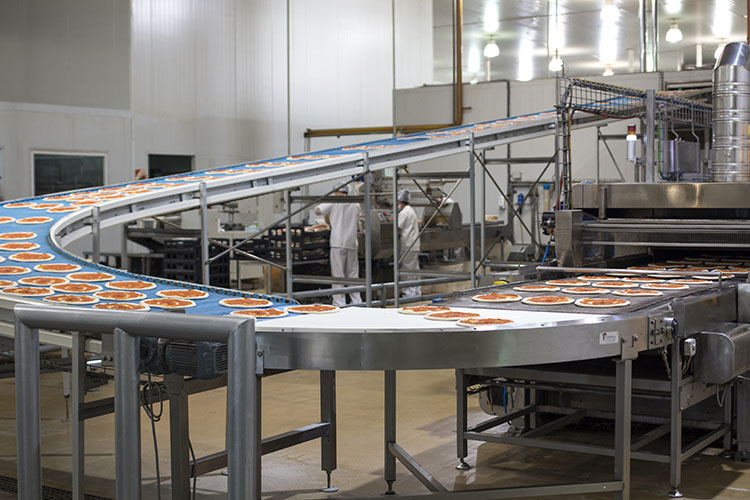
f2m spoke to Luis Videla, the CEO-Owner of Grupo Almar.

The par-baked pizza’s are tranferred towards the freezer, after which they are individually packed
f2m: Mr. Videla, can you tell us more about the Grupo Almar?
Videla: Grupo Almar started in 2002 with 1 shop in Buenos Aires, close to where the bakery is now located. This area was an old private airport and we bought one of the hangars and converted that into a bakery. We started with producing cakes. Within the first 3 years, the company grew from 1 to 16 shops. Because labor was getting more expensive, we had to reconsider the business structure. Also, because we supplied products for different supermarket chains. By 2013, we had 700 employees in the plant. Because then we didn’t had production machines, our production capacity was limited.
That was the reasons why we bought production machines: for Medialunas (Argentinian croissant) and Pizza, we bought a Rademaker Croissant and Pizza line. We also have a breadline from Mecatherm. This development made us increase the production capacity x10, while we could drop back the labor from 700 to 290.
Our last investments were a tin bread line, a bun line with a capacity of 9000 kg/hour and we upgraded our cake line. We now have a total product scope of 200 products.
In 2014 we started franchise chain shops, and we now have up to 50 of these shops. In 2018 we will have a total of 80 franchise shops.
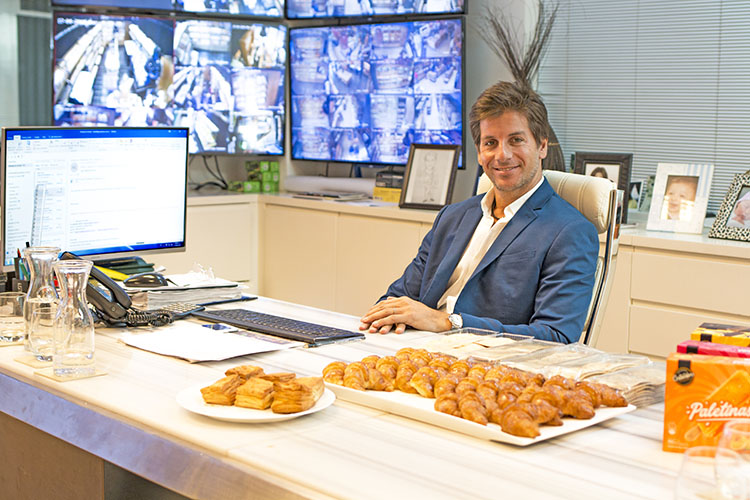
Luis Videla, the CEO-Owner of Grupo Almar
Grupo Almar bought from Rademaker a multifunctional Pizza line, that besides pizza bases, can also produce flatbreads and crackers. This way there are able to double their profits coming out of their Pizza line. Grupo Almar is a creative bakery that establish itself by getting more products out of a production line. In total Grupo Almar produces 200 different products. 8% of total production in the plant consists out of pizza products. Ice cream individual sticks is the company’s latest expansion.
f2m: Do you produce pizza around the clock?
Videla: We produce pizza in 3 daily shifts, and we have the Pizza line up and running up to 20 hours a day. Then between the next production run, we have 4 hours to cool down the oven and to clean the production line.
f2m: How positioned the company itself in the market today and where can customers buy the pizzas?
Videla: Our philosophy is to produce a lot of volume at a low price. Our customers can by our pizzas at our own franchise shops and at Supermarkets. We supply pizza’s in Buenos Aires and other areas of Argentina. Our bakery is positioned in the middle of a civilian area and we have a shop directly at the factory. A lot of people from the area come here to buy their products.
f2m: What products do you produce and how much per year do you produce?
Videla: Like said, we produce a total of 200 different products. In total, we produce 1.200 tons of kilogram products per month. Our bakery produces both Fresh and frozen products. The pizzas that we produce, are what we call Pre-pizza, which are pizza bases topped with tomato sauce. These are pre-baked up to 80% packed individually and then sold. Customers can then top the pizzas and bake them their selves at home. This is the cheapest way for our customers to consume pizzas. The big difference to Europe, is that in Argentina a frozen, topped pizza costs around EUR 10,- in the supermarkets which is for most Argentinians too much to spend on a mean. We offer customers the opportunity to consume pizza at a fair price.
Rademaker Pizza line information
After the mixing process, the dough batches are put into a Chunker low stress sheeter combination to create a continuous dough sheet. A Quick Reductor reduces the sheet’s thickness for the first time. The cross roller rolls the dough widthwise, to increase eventual its width.
2 Gauging Stations reduce the dough thickness further, before the dough sheet is transferred towards the Rademaker proofing system. Here the dough creates its cell structure and develops taste.
After proofing, the dough sheet is cut and pressed into Its final shape. Several sizes and shapes can be produced. The excess dough is automatically collected in bins and placed back into the dough mixing system. This way there is no dough waste.
Finally, the tomato sauce will be deposited onto the pizzas. 3 Stripes of sauce are deposited onto each individual pizza. The tomato sauce is spread over the complete pizza by a rotating sauce leveling device. The sauce is smoothened spread over the pizza, leaving the rim free of sauce. The pizzas now run towards the oven where they are baked for 80%. After baking, the pizzas are cooled down and packaged individually into transparent, plastics bags. Ready to be sold.
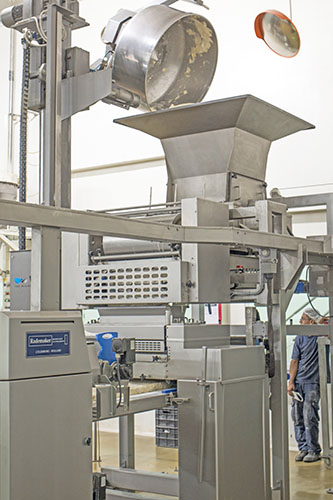
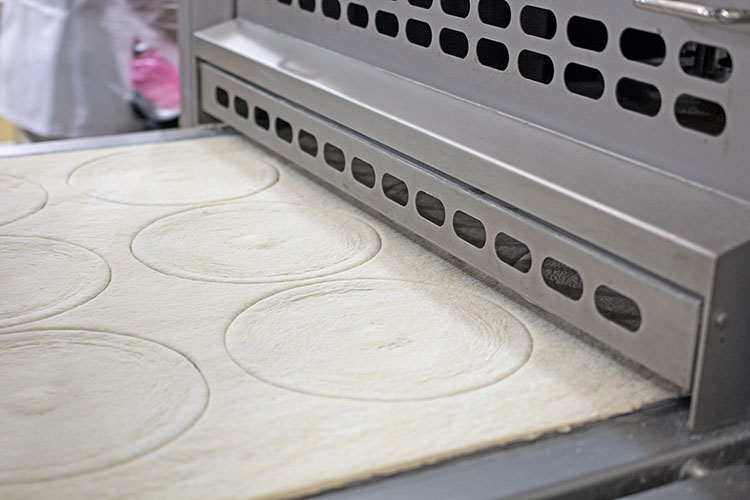
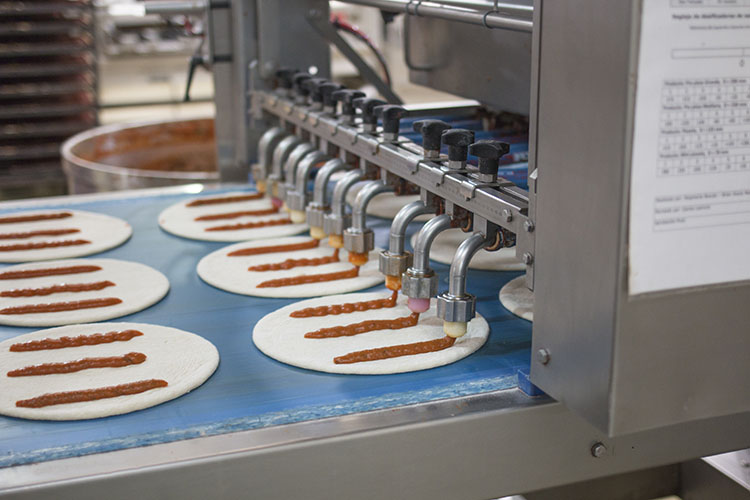
f2m: How do you describe the pizza market in Argentina? Is the market growing?
Videla: Topped pizzas (boxed) are for most Argentinians too expensive to consume. Therefore, the market for complete topped Pizzas is not so big as in the rest of the world. The freezer to freezer way of pizza distribution doesn’t sell here, par-baked, frozen and baked in the shop does sell. With our concept, we sell 200 pre-pizzas for one topped pizza in the supermarket. So, we think that we address the market the right way. It proofs when you look at our sales. And we still see growth in this way of offering our pizzas to the customers.
f2m: Would you describe yourself as number 1 in Argentina, who are the competitors?
Videla: We would not describe ourselves as the number 1 in Argentina, but more as number 2. Our largest competitor is Bimbbo/
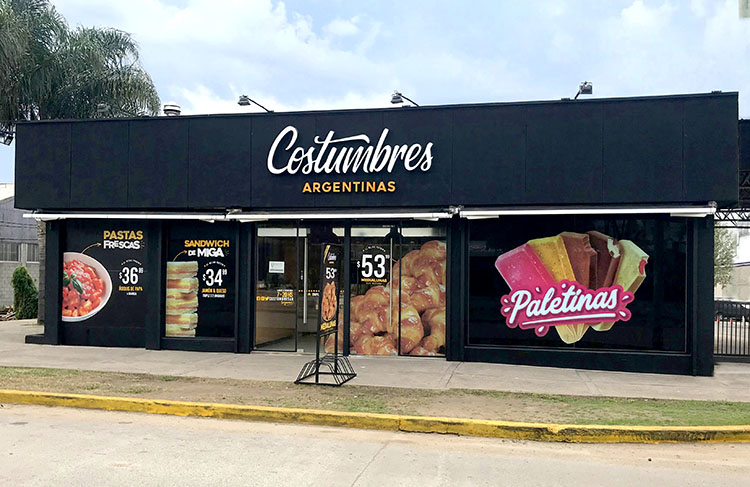
The latest Groupo Almar shop in Buenos Aires
f2m: What products are particularly successful and why? What trend do you see?
Videla: For us as a bakery, the baguette line is most important, followed very closely by the Medialunas line. There for sure is a growth in the croissant market. Trends that we have here, are different than Europe. For example, there is no trend for clean label. Here in Argentina it is very much a price driven market; sell cheap or don’t sell at all. 95% of the population buys products that have a cheap price, and don’t choose much for quality products. To produce volume, you need to have a good price.
f2m: Where do you see the company in 5 years?
Videla: We look ahead for 2 years with our bakery. And there we see an expansion that can feed a maximum of 80 franchise shops. At this moment, the traditional bakery and pizza market exists for 94% (mini family owned local bakeries) and only 6% out of large bakeries like Grupo Almar. But the market is slowly shifting as a natural growth of industry vs artisan bakery is taking place. A local bakery is shrinking in floor space, a general of 100 square meters for a shop including the oven space. Therefore, we see a growth towards more market share and expansion coming up in the upcoming years.
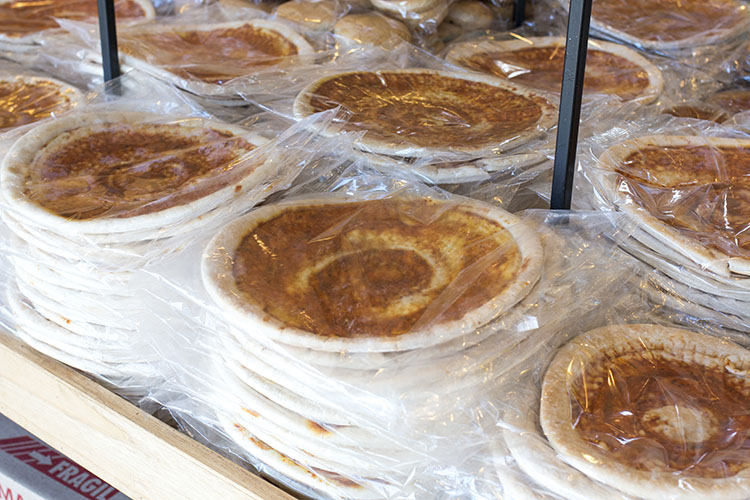
The par-baked pizzas are individually packed and sold
f2m: How did you come to Rademaker-Lines?
Videla: I met Rademaker on the IBIE show in Las Vegas back in 2006. From then on we had contact and started seriously talking about our plans and Rademaker’s contribution towards that.
f2m: How does the cooperation with Rademaker from Europe works?
Videla: We can honestly say that it is very good, we are very satisfied with our co-operation with Rademaker. Rademaker has the best After Service in the market. I guess there is an estimate of 2 to 3 contact moments per year in which we update each other about what is happening, but on a service level we have more contact periods. Our technical department has direct contact with the Rademaker Service Direct department in case there might be a technical issue or spare-part need. As for the machines, we are operating in 3 daily shifts and the Rademaker machines have proven to be highly reliable, well designed. Maintenance is made easy due to good cleaning access.


